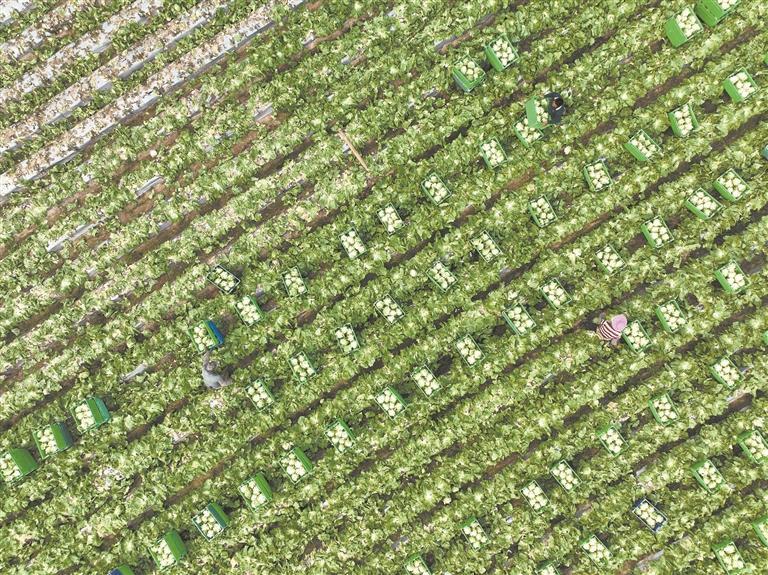- About
- Sustainability

The largest lettuce production base in China—Shengfeng Agricultural Science and Technology Demonstration Park in Huangtang Town, Hui'an County, celebrates a bountiful harvest. (Photo by Lin Jinfeng)
By Journalists Fan Jinlin, Song Yao, Correspondents Gao Junjie, Lu Yanting
Food security is fundamental to national stability and public welfare. President Xi Jinping has long emphasized a broad approach to food security, advocating for resource-based strategies tailored to local conditions. During an inspection in Fujian in October 2024, he reiterated the need for a comprehensive agricultural perspective, fostering specialized industry clusters.
Balancing Mountain and Maritime Resources for Agricultural Development
Quanzhou has effectively leveraged its geographical advantages, integrating mountain and marine resources to enhance food production. With a diverse agricultural landscape, the city has optimized land use through intercropping, forestry-based agriculture, and offshore fisheries. In 2023, the "Broad Food Security Concept" became a national priority in rural and agricultural policies. Aligning with this vision, Quanzhou has strengthened food security measures, expanded its food supply systems, and advanced technological innovation to develop a "Maritime Granary."
Ensuring Food Security: Strengthening Domestic Agricultural Resilience
Stable food production is essential for national security. In 2024, Quanzhou cultivated 1.32 million mu (approximately 88,000 hectares) of grain crops, surpassing government targets and marking the seventh consecutive year of growth. The city successfully mitigated natural disasters, including typhoons and heavy rains, demonstrating resilience in food production.
To sustain agricultural output despite limited arable land, Quanzhou has implemented policies ensuring food security at municipal, county, and village levels. Key initiatives include subsidies for large-scale soybean, potato, and upland rice cultivation and incentives for rehabilitating fallow land. Additionally, the city has allocated 44.65 million yuan to enhance soil fertility and upgrade high-standard farmland, ensuring climate resilience and productivity.
To improve agricultural techniques, Quanzhou has promoted high-yield grain projects and mechanized farming, offering subsidies for large-scale farming demonstration zones. The city has also expanded offshore aquaculture, with annual seafood production exceeding 1.1 million tons. Investment in deep-sea fisheries and sustainable marine farming is accelerating, positioning Quanzhou as a leading maritime agricultural hub.
Expanding Specialty Agricultural Industries
The "Broad Food Security Concept" also emphasizes maximizing local specialty products. Quanzhou has developed high-value agricultural clusters, including tea, vegetables, mushrooms, fruits, medicinal herbs, and livestock. Six key agricultural sectors have surpassed annual output values of 10 billion yuan each, forming a robust industrial ecosystem.
In Dehua County, modern technology has revolutionized poultry farming. The Dehua Black Chicken breeding program, which integrates digital tracking systems, enables consumers to verify product authenticity via QR codes. This initiative has propelled Dehua Black Chicken into the national spotlight as a premium agricultural brand.
Similarly, food technology innovation is transforming the mushroom industry. In Shishi High-Tech Zone, automated production lines ensure year-round golden needle mushroom cultivation, overcoming seasonal constraints through smart farming techniques. These advancements enhance food supply stability and market competitiveness.
From 2025 to 2027, Quanzhou aims to further strengthen its agricultural supply chains, optimizing large-scale production of tea, citrus fruits, pork, and grains. Additionally, specialty agricultural sectors such as free-range poultry, mushrooms, and premium fruits will receive targeted investment to achieve industrial-scale growth.
Technological Innovation: Bridging the Gap Between Research and Agricultural Practice
Enhancing food security requires not only increased food production but also improved food quality. Quanzhou has prioritized agricultural R&D, particularly in seed technology, to reduce reliance on imported crop varieties.
For example, researchers in Jinjiang, in collaboration with the Chinese Academy of Sciences, have developed "Xi Hong 202," a new domestically bred carrot variety. This innovation has established a stable e-commerce supply chain for fresh, processed, and juiced carrots, mitigating reliance on foreign seeds.
Additionally, Quanzhou has introduced water-efficient rice farming techniques to address land and water scarcity. Hui'an County has pioneered a "Grain-Vegetable Rotation" system, integrating drought-resistant rice cultivation with modern irrigation methods, demonstrating a successful model for sustainable agriculture.
Moving forward, Quanzhou remains committed to enhancing food security through technological advancement, diversified food sources, and sustainable agricultural development, reinforcing its position as a key player in China's modern agricultural landscape.
